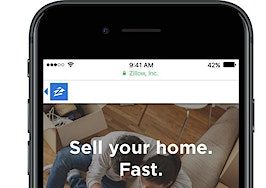- Although the internet is where the majority of buyers find homes, there has been a 10 percent increase in consumers who use agents over the last 20 years.
I started working in real estate back in 1995 — one year before realtor.com was founded, nine years before Trulia (2004) and 11 years before Zillow (2006).
Along the way, I’ve seen providers, sites and tests come and go, and each had been accompanied by some fear from agents and Realtors who thought they’d lose control of their listings or be phased out like taxis (because of Uber), travel agencies (because of Expedia) and land lines (because of cell phones).
The latest threat is Zillow Instant Offers, which allows investors to connect with sellers directly, with or without the help of an agent.
Agents, you’re still needed
We’re still here.
Statistics show our industry is stronger than ever. Buyers tend to find homes on their own, but they still want assistance; sellers list homes, but they are willing to pay a buyer’s agent or a transaction broker to manage the transaction between the two parties.
Uber riders aren’t contacting taxi drivers to make sure their Uber experience will be a good one, right?
I believe we’ve been choosing the wrong service industry to study: We should be looking at the medical industry if we really want to look at our future, understand why our relationships are so important and be aware of the challenges ahead.
Do people still want real estate agents?
The National Association of Realtors (NAR)* has statistics that go back to 2000:

Statistics are tough for me, but trends are pretty easy. I think the collection of data and percentage of error will be fairly consistent year-to-year (missing data in years that NAR didn’t collect data).
Patterns in the chart tell me the trend is for more agent involvement regardless of data on internet, proliferation of for sale by owner (FSBO) sites or a more informed consumer.
Median units per agent seems to follow the economy (or perhaps the number of members?) more than any other statistic.
Realtor.com was started in 1995, Trulia in 2004 and Zillow in 2006. Statistics tell us, as I would expect, that more buyers are finding their homes on the internet first. In 2001, only 8 percent is shown, with each year gaining until 2016 where, for the first time, more than half of buyers first found the home they purchased on the internet.
I’m not surprised this has happened, but I am a little surprised it took so long. In a very non-scientific study, I checked Zillow for 14 metro areas in the U.S.:
- Wichita, Kansas
- Denver
- Phoenix
- Seattle
- San Jose, California
- Los Angeles
- Miami
- Washington, D.C.
- Raleigh, North Carolina
- New York City
- Trenton, New Jersey
- Chicago
- Dallas
- Houston
According to Zillow, 124,985 homes are listed by agents, 2,951 are listed by owners and approximately 2 percent of the listings are FSBO.
Variance?
Wichita is 4 percent and Seattle is 3 percent. Those were the high ratio of FSBO. Not very scientific, and smaller metro areas could have higher numbers.
Although the internet is where the majority of people are finding the homes they purchase, there has been a 10 percent increase in consumers who use agents over the last 20 years.
If, as predicted, the internet would end our profession — or significantly damage it — why is the number of buyers who use agents increasing?
Medicine and real estate
When I want to know how to treat my illness, I Google it.
For years, every person I meet tells me how I can cure my psoriasis, but I still have a family physician. I chose my physician, set appointments to meet her and have stayed with her for 20 years.
I may not see her but every five years, but I have my doctor.
It is a very personal relationship — it is my health and my body, and I don’t think physicians are interchangeable.
How should you choose a physician? I find a lot of websites that review doctors. Reviews are good, but according to the Blue Cross Blue Shield (BCBS) website, we should ask for a referral from friends or co-workers, then visit that physician and see if we’re a good fit.
If you’re moving, BCBS suggests you get a referral from your current doctor for someone in your new location. Sound familiar?
According to NAR, homebuyers found agents the following ways in 2016:
- 42 percent were referred by a friend
- 11 percent previously used them
- 9 percent were found on a website
- 6 percent were found during open houses
Homesellers were found the following ways:
- 39 percent were referred by a friend
- 25 percent were previous clients
- 4 percent were direct contact
- 4 percent were from an agent referral
- 4 percent were found on a website
- 4 percent were found during an open house
Fifty-three percent of people already knew their agent, and 64 percent knew someone who knew the agent.
There is nothing shocking to us in the industry, and I think it’s very similar to medicine: Recommendations, checking ratings on websites and trying in-person visits are all normal.
I believe finding a home and searching for my personal medical treatment are very parallel. I want my agent and my doctor to care about my family. I want them to be knowledgeable, familiar with the specialists I need, punctual, personable and so on.
I don’t go to the emergency room every time I need treatment because the doctors there aren’t familiar with my medical history. My real estate agent is part of my family life for a month or longer during each transaction.
I like personalized service with continuity and connection. I want my doctor and my agent to understand my financial position, my family situation and my needs. I want one person to know these things so I don’t have to explain everything several times to new people.
This is all very personal; the relationship is about my needs.
Medicine as an analogy
Medicine has been evolving in part because larger corporations are now employing physicians rather than self-employed doctors.
This is different than an agent associating with a broker or doctors being partners.
According to Becker Hospital Review, in 2000, two-thirds of physicians were in private practice. Now, that number has decreased to a third. By contrast, 86 percent of Realtors are independent contractors, 5 percent are employees and 9 percent describe themselves as “other.”
A physician friend moved to Wichita to work for a private practice after working in New York City and Los Angeles. He left corporate medicine because, in his mind, corporations have figured out how to make money off physician labor.
I’m sure there were advantages, but he objected to depersonalization and demands based on metrics. At the corporations, he could no longer give patients the time he felt they deserved. His contract was based on the number of patients per hour, and he was asked to keep increasing that number.
Over time, patients were becoming less his, and more the group’s. He was obligated to see anyone who needed an appointment. Rather than just tending to his patients, he was forced to see more in limited time.
The biggest danger
Most physicians go into medicine because they truly care about helping people. I understand that metrics may assist in getting more patients in the door, but I don’t understand why a doctor would be encouraged to spend less time with a patient than was needed.
I’d like to think that real estate agents are more about helping people and less about fitting clients into the allotted time.
I think the biggest danger in real estate would be a future where all agents became employees and corporate metrics were applied for agents, setting price ranges you must work within and limiting the amount of time you can spend with each client.
This lack of relationship would be the real damage our industry.
Greg Fox is the owner and broker at Better Homes and Gardens Real Estate Alliance. You can follow him on Facebook and LinkedIn.












